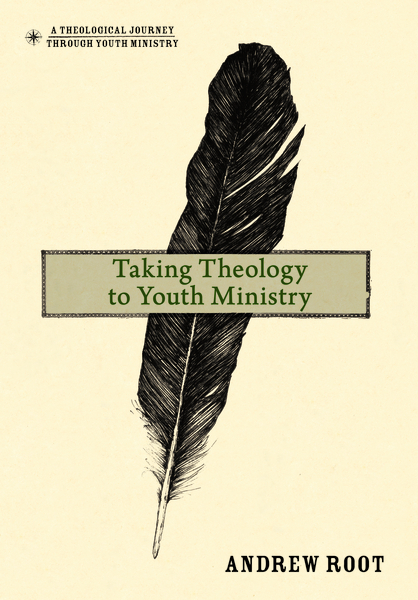
[vc_row][vc_column width=”1/1″][vc_column_text]
 Author: Andrew Root
Author: Andrew Root
Reviewed by: John Sutton, Youth and Children’s Ministry Director at Covenant Presbyterian Church in Fayetteville, GA.
Taking Theology to Youth Ministry (TTtYM) by Andrew Root is the first in a series of four 100-ish page “narrative” books about youth ministry. They follow Nadia, a youth minister who wrestles with what youth ministry is and how she does it. But the narrative is more the skeleton for Root’s discussion of youth ministry (in fact, Nadia’s story is more the bookends of each chapter). Root’s main theological emphasis is that all ministry is participating in the action of God. Youth ministry is simply participating in what God is doing in the lives of students. I really appreciate his main point. It portrays God as living and active; He is not a subject to be studied, He is personal, loving, and at work. His thesis also gets us out of exhausting, selfish, me-centered ministry. We youth workers don’t have to be perfect or the most creative or biggest personality; after all, “Moses’ weakness becomes the material for God’s own action” (p.48). Youth ministry is something God does. God is already at work in the lives of students and we are to help students see this. “God tells us, ‘Stop trying to do youth ministry. I am the one who ministers through my love for young people. Follow me as I love young people…” (p.47).
But along with this, Root makes statements that are confusing at best and unbiblical at worst. Root talks about the judgment and love of God, both of which are essential to the gospel. But his “judgment of sin” seems to have nothing to do with God’s just reaction to our rebellion. Rather, judgment, according to Root, is God’s revealing our weakness and inability to do anything apart from Him. “[Love] blooms from the judgment of God, which whispers, ‘I know you are weak. I know you are sad. But I am strong. Let me be your joy.’ (p.47)” While we are weak and incapable of doing any heart changing ministry without God, and God is our strength in weakness and joy in sadness, this is not a definition of God’s judgment. In Root’s definition of judgment, I’m afraid we lose a God who must punish sin and pours out judgment and wrath on Jesus instead of His children.
I picked up on a universalist tone, especially evident toward the end of the book when he talked about evangelism. “Youth ministry is not about getting kids to ‘accept’ the gospel… It’s about helping them see and participate in God’s mission as the gospel (p.92).” He goes on to say: “Nadia would reach out to young people in the community not with a vision of converting them all, but with the desire to be near to them as God is near them (pp.92-93).” In summary: “Mission is witnessing in word and act to the fact that we have been reconciled” (p.89).
Positively, Root talks about our calling to be present in the lives of students. He uses words like gospel and mission. He even talks about the “cross of death [that] brings eternal life” (p.42) and “reconciliation” (p.91). But it feels like we are using the same words with different meaning. I get the sense that Root believes that all people “have [already] been reconciled” to God. He says our job is not to convert students, which I would agree with, to the extent that conversion is something God does. But Root seems to imply that conversion doesn’t need to happen at all. All this is picked up from pages of flowery, sometimes confusing explanation.
I would not recommend this book. Root said a lot of good things, especially regarding God as the main actor in youth ministry. But he says a lot of things that are unclear and unbiblical. If you want a book that gives a beautiful and helpful picture of ministry, I would rather see you read a book like Sensing Jesus: Life and Ministry as a Human Being by Zack Eswine. If you were attracted to TTtYM for its brevity, yes, Eswine’s book is longer, but you end up reading more pages if you read all four of Root’s books. Eswine is theologically solid, poetic in his writing, and has been good for my soul. Unfortunately, while I like what Root was going for, I can’t say the same for the first book of his series.[/vc_column_text][/vc_column][/vc_row]
